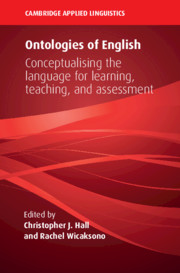Book contents
- Ontologies of English
- The Cambridge Applied Linguistics Series
- Ontologies of English
- Copyright page
- Dedication
- Contents
- Figures
- Tables
- Contributors
- Series Editors’ Preface
- Acknowledgements
- Transcription Conventions
- Part I Introduction
- Part II English in/for L2 Learning and Teaching
- Part III English in Schools
- Part IV Assessing English
- 9 English Varieties and Targets for L2 Assessment
- 10 The Role of the L1 in Testing L2 English
- 11 Mind the Gap
- Part V English in Lingua Franca Contexts
- Part VI English and Social Practice
- Part VII Commentary and Conclusions
- Index
- References
11 - Mind the Gap
Dis/Continuities in the UK Assessment of L1 English Language
from Part IV - Assessing English
Published online by Cambridge University Press: 24 December 2019
- Ontologies of English
- The Cambridge Applied Linguistics Series
- Ontologies of English
- Copyright page
- Dedication
- Contents
- Figures
- Tables
- Contributors
- Series Editors’ Preface
- Acknowledgements
- Transcription Conventions
- Part I Introduction
- Part II English in/for L2 Learning and Teaching
- Part III English in Schools
- Part IV Assessing English
- 9 English Varieties and Targets for L2 Assessment
- 10 The Role of the L1 in Testing L2 English
- 11 Mind the Gap
- Part V English in Lingua Franca Contexts
- Part VI English and Social Practice
- Part VII Commentary and Conclusions
- Index
- References
Summary
This chapter explores how the subject of L1 English Language is currently assessed in England at different stages of learning, drawing on official requirements as set out by the United Kingdom Department for Education (DfE), on test papers and assessment arrangements devised by the Standards and Testing Agency (STA), on the subject criteria as defined by the exams regulator for English qualifications (Ofqual), and on the qualifications that have been developed by the various exam boards, termed ‘Awarding Bodies’ or ‘Awarding Organisations’, within the United Kingdom.
- Type
- Chapter
- Information
- Ontologies of EnglishConceptualising the Language for Learning, Teaching, and Assessment, pp. 209 - 230Publisher: Cambridge University PressPrint publication year: 2020

